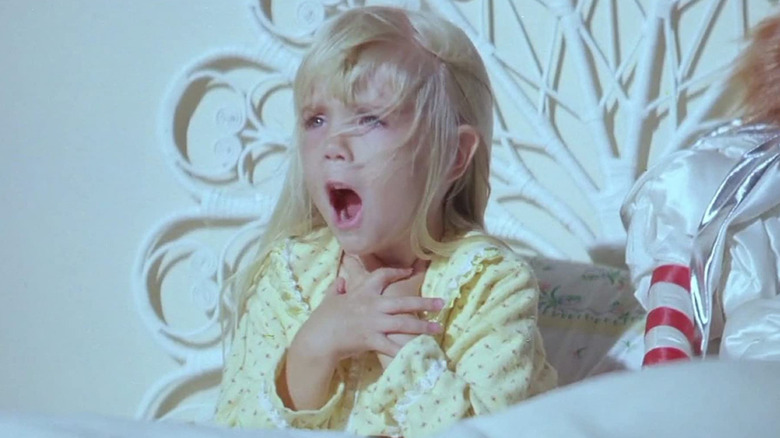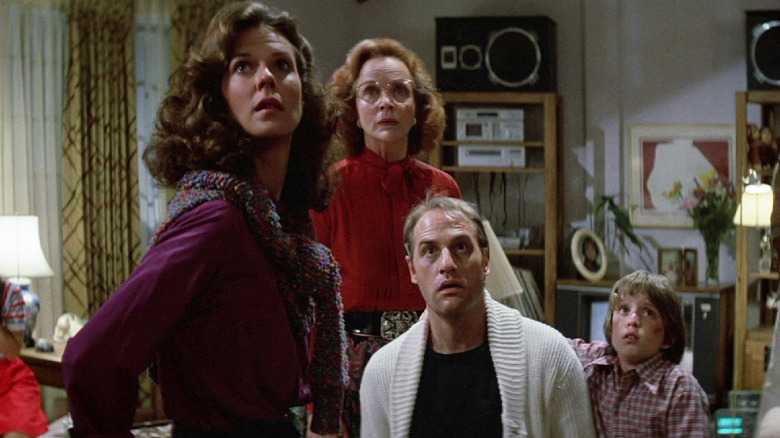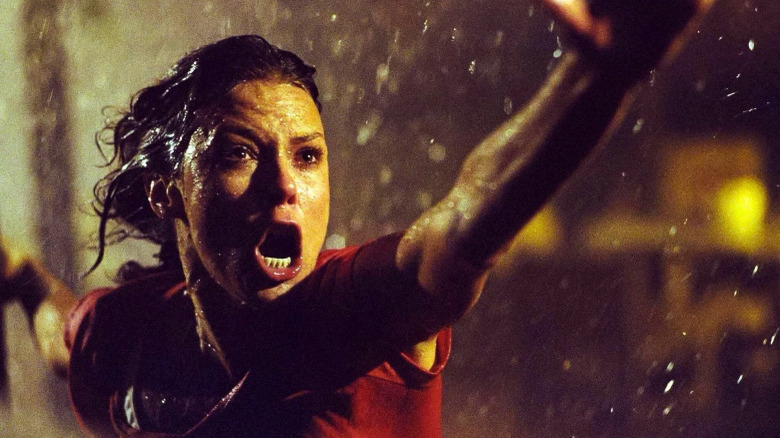The Daily Stream: Poltergeist Explores The Dark Side Of Spielberg's Suburbia
(Welcome to The Daily Stream, an ongoing series in which the /Film team shares what they've been watching, why it's worth checking out, and where you can stream it.)
The Movie: "Poltergeist" (1982)
Where You Can Stream It: HBO Max
The Pitch: The Freelings lead an unremarkable but contented life in the sunny, newly-built suburbs of Cuesta Verde, California. Over time, however, a series of baffling incidents lead them to suspect their home is haunted. When the youngest member of their family, the adorable young Carol Anne (Heather O'Rourke) is taken by those same sinister entities, her loving parents Diane (JoBeth Williams) and Steve (Craig T. Nelson) contact a team of "experts" in the field of parapsychology in a desperate attempt to rescue her.
Before we go any further, let me make one thing clear. I've no interest in swaying you this way or the other in regard to the long-standing debate over who truly directed "Poltergeist" — the film's co-writer and executive producer Steven Spielberg or its credited helmer Tobe Hooper. The proof is in the pudding with this one. When you watch it, there's no doubt both Spielberg and Hooper put a lot of themselves into the movie, so much so neither one can take full credit for being its "author."
Why it's essential viewing
"Poltergeist," like "E.T. the Extra-Terrestrial," was born out of Spielberg's unproduced treatment for "Night Skies," a horror-themed sequel to "Close Encounters of the Third Kind" he cooked up in the late 1970s. The two represent flip sides of Spielberg's vision of suburbia. In the "E.T." version, a lonely child whose parents are divorced finds solace from an "imaginary" friend in the form of a very real, benign other-worldly visitor. In "Poltergeist," the happy child of a married couple very much still in love makes some not-so-imaginary friends in the form of vindictive phantoms.
Debates about authorship be damned, "Poltergeist" plays as a seamless fusion of directorial styles. Like the suburb dwellers in other early-era Spielberg films, the family in the movie is endearing yet believable. The kids oscillate from loud and crude to naive and weird in the way real ones do, and the parents are tenderly patient with them, only cursing when they're out of earshot. Still, they have their limits and need a little extra help unwinding after a long day.
In time, Spielberg's whimsy and wonder give way to Hooper's dread and terror. The gnarled tree outside a bedroom window transforms into a clawing, roaring monster. Gooey ectoplasm bubbles at the edges of a doorway leading to an extra-dimensional tear in the fabric of space. A quick trip to the kitchen for a snack turns into a Lynchian nightmare where a piece of meat comes to life (and it only gets grosser from there). "Poltergeist" might not achieve the same disturbing verisimilitude that Hooper's "The Texas Chain Saw Massacre" does but it shares many of the same visceral qualities.
This house is clean (but the neighborhood isn't)
Watching "Poltergeist" in 2022, it's hard not to read the film as a horror allegory for Reagan's America. Its opening shot is that of an extreme close-up of a TV playing "The Star-Spangled Banner" with a montage of patriotic imagery, as though daring you to see the dark truth peeking through the cracks. Steve, a successful real estate developer, is later shown reading a copy of "Reagan: The Man, The President" in bed. When he comes to learn the unsavory truth about the land the very white (in all meanings of the descriptor) Cuesta Verde was built upon and his own culpability in his company's deeds, his family's suffering begins to feel like karma for his actions.
Of course, when they made the film in the early '80s, Spielberg and Hooper only had a glimmer of the pain and suffering Reagan would inflict with his gross negligence of the HIV/AIDS crisis, his expansion of the racist "War on Drugs," and so much more. But both of them excelled at using the horror genre as a mechanism for social criticism. In "Jaws," Spielberg calls out the men in suits fixated on keeping the wheels of capitalism spinning, even at the cost of human lives. In "The Texas Chain Saw Massacre," Hooper satirizes the American nuclear family as a warped and distorted notion.
Once again, "Poltergeist" acts as a meeting of the minds in this respect, merging Spielberg and Hooper's political concerns into a story where it's more than just the house that's haunted. 40 years later, the duo's paranormal thriller has lost little of its ability to unsettle.


